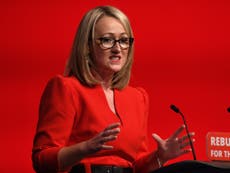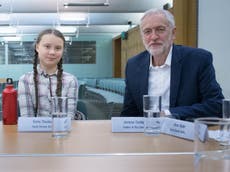Corbyn's rise was based on the support of young people. He'll lose us if he doesn't back a second Brexit vote
The European election represents an enormous opportunity for Labour to stake its claim to leadership at a time of national crisis – but will Corbyn end up handing that mantle to Nigel Farage?

I remember quite vividly the first time that I met Jeremy Corbyn. It was at a Labour Party drinks reception in the early summer of 2018, in the stifling heat of a rather stuffy and uninspiring events space in central London.
I had long been curious about the enveloping appeal the party leader apparently had in personal interactions. I had never considered him an especially moving public speaker, but again and again colleagues in the Labour movement told me "just wait until you see him in the flesh".
So it was with a mix of scepticism and expectation that I stood before a stage raised to a slightly awkward height, in the oppressive heat, to see the man speak for the first time. The speech was good. His passion was obvious and the delivery was steady – but still I was left none the wiser as to the source of the near mythical appeal Jeremy seemed to hold in the movement. At least until I approached him.
I sidled up to the Labour leader in pursuit of the obligatory selfie before being whisked through the throng by a more senior party member to find myself standing right beside JC. He turned, shook my hand and we took the all-important picture. Then, just as I was about to make way for the crowding to resume, he turned to look at me and said "thank you for all you do". I smiled and mumbled something approving and he said, "No really – thank you." And I believe he meant it.
The truth is that thousands of young people have had a similar experience with the man who hopes to be the next prime minister. Some are lifelong Labour supporters, like myself; others are among those generally less engaged with politics, who have been drawn to Corbyn’s self-effacing image since he took the leadership in 2015. Young people were indeed an essential part of the coalition that swept Corbyn to victory within the Labour Party, in both his May 2015 leadership triumph and again when he was challenged in the summer of 2016 following what some claimed was a lacklustre commitment to the Remain campaign during the EU referendum. Young people kept faith with Jeremy Corbyn during that time and the leader’s team will hope that they continue to do so, for they are a vital piece of the electoral puzzle that must be solved if Corbyn is to one day take up position in 10 Downing Street.
Analysis of the 2017 election results leave no doubt that Labour’s strong performance was built on securing a thumping majority of the vote from those under the age of 30. It is also the case that a majority of this demographic support holding a Final Say referendum on Theresa May's Brexit deal. With this in mind, as those helming the Corbyn project consider their next move in relation to the Brexit crisis, any attempt to sidestep a commitment to a public vote on the final deal could have devastating impact for their hopes to rely on the votes of young people – much less the support of the young activists who pound the pavement for Labour at election time.
Before Labour faces the country at any general election, though, comes the more immediate question posed by the upcoming European Parliament elections to be held on 23 May. The polls thus far suggest that Labour’s strongly pro-European lineup of candidates, including existing MEP Seb Dance and Best for Britain’s Eloise Todd, has them holding position as the Tories collapse. But there is work to do if they are to beat out Nigel Farage’s Brexit Party.
Having already been treated to the undignified spectacle of the anti-Brexit Lord Adonis attempting to line himself up behind Labour’s current non-committal policy, it seems likely that the election campaign will descend quickly into chaos should Labour not pursue a commitment to a public confirmatory vote on any Brexit deal in its manifesto.
This election represents an enormous opportunity for Labour to stake its claim to leadership at a time of national crisis. But if the party continues in its current quixotic pursuit of constant ambiguity, then it risks handing that mantle to Farage – a man whose position as kingmaker would be disastrous for Corbyn.
The International Commission of Labour’s National Policy Forum, which represents a body of opinion ranging from party activists to trade unionists to MPs and MEPs, unanimously agreed to endorse the inclusion of a confirmatory vote on any Brexit deal in the manifesto for the EU elections. The leader himself actually voted for the amendment, laid by Peter Kyle, in the indicative votes process of 1 April, which read “That this House will not allow in this Parliament the implementation and ratification of any withdrawal agreement and any framework for the future relationship unless and until they have been approved by the people of the United Kingdom in a confirmatory public vote.”
I believed Corbyn when he expressed his gratitude to me, I still believe it, but now I have to encourage him to keep faith with young people who have placed their hopes with him. The test for Corbyn at today's NEC meeting, where party policy about for the EU elections will be decided, is not simply one of his position on Europe. It will concern a more existential question about his commitment to the concept of party democracy. Since the 1980s, Corbyn has championed the concept that party policy should reflect the will of the members rather than be shaped in backroom deals by senior figures. But young members are now overwhelmingly concerned that their voices will be ignored as the decision on whether or not to fully support a public vote is influenced more by unelected "advisors" than the clearly expressed will of the party membership.
I would ask Jeremy and those that work with him, if nothing else, to consider the bare electoral reality that they desperately need the masses of young people who support him to continue to do so. The only way to ensure that bond is not broken is to deliver a Final Say on the Brexit deal.




Join our commenting forum
Join thought-provoking conversations, follow other Independent readers and see their replies